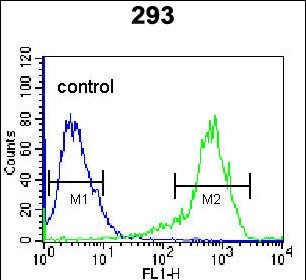KARS Antibody (N-term)
Purified Rabbit Polyclonal Antibody (Pab)
- SPECIFICATION
- CITATIONS
- PROTOCOLS
- BACKGROUND

Application
| WB, FC, E |
|---|---|
| Primary Accession | Q15046 |
| Other Accession | NP_005539.1, NP_001123561.1 |
| Reactivity | Human |
| Host | Rabbit |
| Clonality | Polyclonal |
| Isotype | Rabbit IgG |
| Calculated MW | 68048 Da |
| Antigen Region | 70-98 aa |
| Gene ID | 3735 |
|---|---|
| Other Names | Lysine--tRNA ligase, Lysyl-tRNA synthetase, LysRS, KARS, KIAA0070 |
| Target/Specificity | This KARS antibody is generated from rabbits immunized with a KLH conjugated synthetic peptide between 70-98 amino acids from the N-terminal region of human KARS. |
| Dilution | WB~~1:1000 FC~~1:10~50 E~~Use at an assay dependent concentration. |
| Format | Purified polyclonal antibody supplied in PBS with 0.09% (W/V) sodium azide. This antibody is prepared by Saturated Ammonium Sulfate (SAS) precipitation followed by dialysis against PBS. |
| Storage | Maintain refrigerated at 2-8°C for up to 2 weeks. For long term storage store at -20°C in small aliquots to prevent freeze-thaw cycles. |
| Precautions | KARS Antibody (N-term) is for research use only and not for use in diagnostic or therapeutic procedures. |
| Name | KARS1 (HGNC:6215) |
|---|---|
| Synonyms | KARS, KIAA0070 |
| Function | Catalyzes the specific attachment of an amino acid to its cognate tRNA in a 2 step reaction: the amino acid (AA) is first activated by ATP to form AA-AMP and then transferred to the acceptor end of the tRNA (PubMed:18029264, PubMed:18272479, PubMed:9278442). When secreted, acts as a signaling molecule that induces immune response through the activation of monocyte/macrophages (PubMed:15851690). Catalyzes the synthesis of the signaling molecule diadenosine tetraphosphate (Ap4A), and thereby mediates disruption of the complex between HINT1 and MITF and the concomitant activation of MITF transcriptional activity (PubMed:14975237, PubMed:19524539, PubMed:23159739, PubMed:5338216). |
| Cellular Location | [Isoform Cytoplasmic]: Cytoplasm, cytosol. Cytoplasm. Nucleus. Cell membrane; Peripheral membrane protein. Secreted Note=Secretion is induced by TNF-alpha (PubMed:15851690). Cytosolic in quiescent mast cells. Translocates into the nucleus in response to mast cell activation by immunoglobulin E (PubMed:23159739) |

Thousands of laboratories across the world have published research that depended on the performance of antibodies from Abcepta to advance their research. Check out links to articles that cite our products in major peer-reviewed journals, organized by research category.
info@abcepta.com, and receive a free "I Love Antibodies" mug.
Provided below are standard protocols that you may find useful for product applications.
Background
Aminoacyl-tRNA synthetases are a class of enzymes that charge tRNAs with their cognate amino acids. Lysyl-tRNA synthetase is a homodimer localized to the cytoplasm which belongs to the class II family of tRNA synthetases. It has been shown to be a target of autoantibodies in the human autoimmune diseases, polymyositis or dermatomyositis. Alternatively spliced transcript variants encoding different isoforms have been found for this gene.
References
McLaughlin, H.M., et al. Am. J. Hum. Genet. 87(4):560-566(2010)
Kepp, O., et al. Cell Cycle 9(15):3072-3077(2010)
Segat, L., et al. Vaccine 28(10):2201-2206(2010)
Dastani, Z., et al. Eur. J. Hum. Genet. 18(3):342-347(2010)
Kawamata, H., et al. J. Biol. Chem. 283(42):28321-28328(2008)
If you have used an Abcepta product and would like to share how it has performed, please click on the "Submit Review" button and provide the requested information. Our staff will examine and post your review and contact you if needed.
If you have any additional inquiries please email technical services at tech@abcepta.com.













 Foundational characteristics of cancer include proliferation, angiogenesis, migration, evasion of apoptosis, and cellular immortality. Find key markers for these cellular processes and antibodies to detect them.
Foundational characteristics of cancer include proliferation, angiogenesis, migration, evasion of apoptosis, and cellular immortality. Find key markers for these cellular processes and antibodies to detect them. The SUMOplot™ Analysis Program predicts and scores sumoylation sites in your protein. SUMOylation is a post-translational modification involved in various cellular processes, such as nuclear-cytosolic transport, transcriptional regulation, apoptosis, protein stability, response to stress, and progression through the cell cycle.
The SUMOplot™ Analysis Program predicts and scores sumoylation sites in your protein. SUMOylation is a post-translational modification involved in various cellular processes, such as nuclear-cytosolic transport, transcriptional regulation, apoptosis, protein stability, response to stress, and progression through the cell cycle. The Autophagy Receptor Motif Plotter predicts and scores autophagy receptor binding sites in your protein. Identifying proteins connected to this pathway is critical to understanding the role of autophagy in physiological as well as pathological processes such as development, differentiation, neurodegenerative diseases, stress, infection, and cancer.
The Autophagy Receptor Motif Plotter predicts and scores autophagy receptor binding sites in your protein. Identifying proteins connected to this pathway is critical to understanding the role of autophagy in physiological as well as pathological processes such as development, differentiation, neurodegenerative diseases, stress, infection, and cancer.




